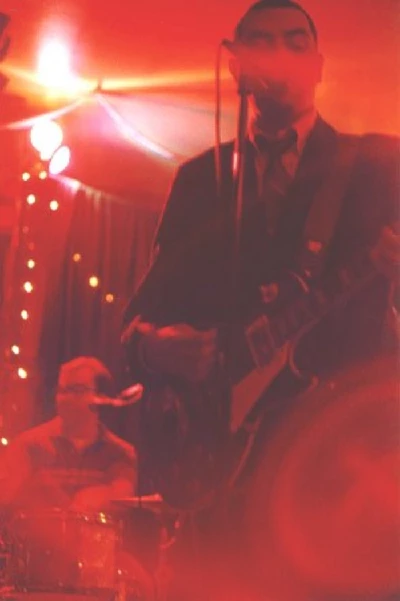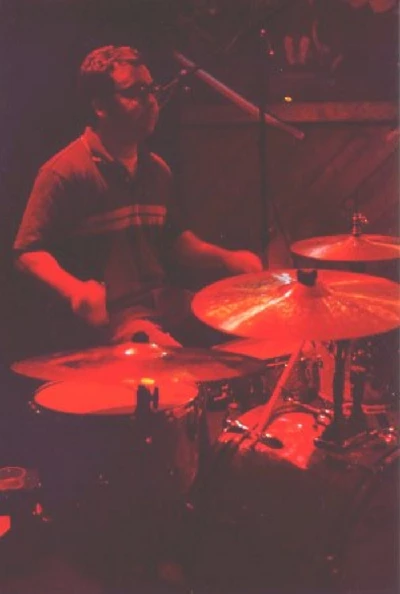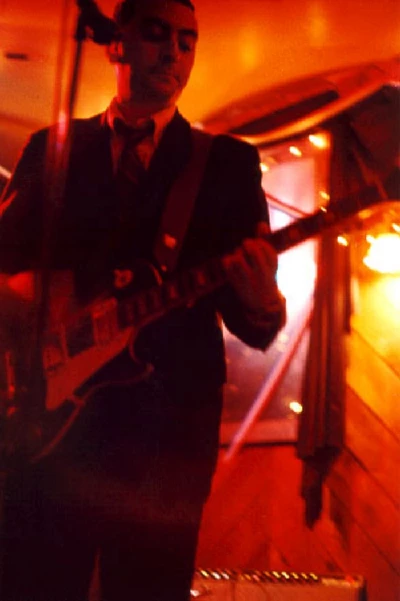published: 13 /
1 /
2002

‘Mishima’ are one of the most unconventional and distinctive acts on the Boston independent music scene. First formed two years ago, they a duo, comprising of guitarist and lead vocalist Arto Payaslia
Article
‘Mishima’ are one of the most unconventional and distinctive acts on the Boston independent music scene. First formed two years ago, they a duo, comprising of guitarist and lead vocalist Arto Payaslian and drummer and backing vocalist Sean O’ Brien, but have the structured sound and force of a full scale band. Mishima’s first single, the highly acclaimed ‘Stop Swerving’, which has a limited run of only 500 copies, and which is released on seven inch vinyl only, came out on ‘Dahlia Records’, a small local label, in July.
Arto Payaslian and Sean O’ Brien first met when Payaslian returned to his native city of Boston in late 1996 after spending some years living and working in Los Angeles, and the following year placed an advertisement in a local arts newspaper to put together a band.
“When Sean responded, it turned out that he lived a few streets down from me.” Payaslian recalls in an interview, the group’s first British one, with Pennyblackmusic.
Payaslian and O’ Brien, who are both 28 years old, had been in other groups before Mishima. O’ Brien, who comes from an Irish background and whose grandfather was a drummer in jazz outfits , played drums in a punk group ‘Crossface’ as a teenager in the late eighties,and latterly also in a Western Massachusetts act, ‘Trip Odometer’, who released one album in the mid nineties before splitting.
Payaslian meanwhile “was in two bands when I was living in California. Neither ever played out, but one of the bands was an assortment of cello, guitar and percussion. It was like ‘Belle’ and Sebastian’ in some ways, or early ‘REM’. After that I played in a more traditional four piece guitar-based band.”
Of Armenian heritage, Payaslian has also written a lot of solo material and having “ grown up with that traditional Armenian folk music, and played guitar all my life, learnt to incorporate some Armenian musical ideas into my own songs.It doesn’t really get into the Mishima stuff that much, because when I am writing Mishima songs, we definitely have our own sound now, but in a lot of my solo stuff there is a lot more of an influence from that angle.”
At initial Mishima rehearsals, the duo primarily concentrated and practiced on songs written by Payaslian, but when O’ Brien, who is also a songwriter in his own right, started to bring his musical ideas to sessions, the pair began to write together.
“When we got together, it turned out that we had a lot in common as individuals. We did a lot of talking about music, and the kind of music we wanted to create. Over time as we got to know each other better, and as I saw his strengths, and he saw my strengths we started seeing that we had very similar visions of pop music. It became much more co-operative.”
Mishima, who take their name from the Japanese writer Yukio Mishima, had originally been planned as a trio, but with Payaslian and O’ Brien beginning to undertake live work, and unable to find a suitable bass player, they made the decision to continue working as a duo.
“We started playing out in public, and people’s reactions were very positive in terms of the sound, and the fullness of the sound. We had been trying out bass players all along, and it just never really clicked. One day it was a very natural decision. We realised “We keep doing shows, and they keep doing well. We like the way it sounds, and other people seem to like the way it sounds.” Since then, it’s never really been a thought. We definitely consider ourselves a band. We don’t really emphasis the two-piece thing that much.”
Although Mishima’s sound is not deliberately Armenian or Irish influenced, both members of the group are immensely proud of their cultures, and Payaslian feels that the music of both heritages has inspired them to push to a greater level with their songwriting.
“Subconsciously it must have had some kind of influence” he reflects. “Outwardly though listening to the music I would really doubt that someone would hear a song and say “I think I sense a little Irish jig in there or a little Armenian motif”. I think that it is more aesthetic and personal. Sean is proud of his heritage, and proud of Irish music, and I think because of that he has very high expectations of the kind of pop music that we create as Mishima. I feel the same way. I am very inspired by Armenian folk music. I think that it is
genius, absolutely beautiful music. In many ways it is actually similar to Irish music, but when it comes to Mishima the way I draw on that is I also have very high expectations for the group and want to create as sensitive and as creative pop music as we can.”
The band have now developed their sound to a stage “in which we have become a little more willing to play around with the structure of our songs, and to make them a little bit more dynamic, and to see what there still is that we haven’t done with two people. We go for songs that people can reflect on, rather than just be in the background and that can actually really grab them.”
‘Stop Swerving’ perfectly embodies this. Edgy and tense in tone, it is reminiscent of acts such as ‘Pavement’, ‘Husker Du’, ‘Sugar’ and the ‘Blur’ of ’13’ and has both a raw energy and a sense of tight, compressed urgency. Payaslian’s nervy, resonating guitarwork and O’ Brien’s matter-of-fact, solid drums act as both principal and backing instruments, each swooping in and out of the fore of the mix, and give the piece an infectious and compelling rhythm. The thoughtful and literate lyrics are about “a road trip that a child is taking with his Mum and Dad, and the emotional distance that is occuring between the parents that the kid is witnessing. He loves his parents, but he is not quite sure what is going on and the parents are trying to keep a smile on their face, but something is not quite there.”
‘Familiar Marks’, the B Side of ‘Stop Swerving’, first appeared on a Boston bands compilation album ‘A Place to Call Home’ which was released at the end of last year. It is in similar musical vein, but giving greater precedence to O’ Brien’s backing vocal harmonies, is slightly less intense and more upbeat in style. ‘Familiar Marks’ lyrics are “more abstract” says Paylaslian. “The main gist there is someone that is trying to sound positive even though there are wounds, and scars that have not healed, and that may never heal, and who is looking towards meeting somebody that is going to maybe help heal him of some of these past wounds and his trauma .”
Both tracks were recorded by Boston producer Pete Weiss at his own Zippah Studios in September 1998. Weiss , who has become something of a regular in these pages, has worked with acts such as ‘The Willard Grant Conspiracy’, Charlie Chesterman, ‘The Magdalenes’, Paula Kelley and former ‘Velvet Underground’ members, Moe Tucker and Doug Yule. He is also a songwriter and a multi-instrumentalist, and fronts his own group ‘Pete Weiss and the Rock Band’.
“We met him at a show. He is a delightful guy, just such a pleasant person. We gave him a demo and he really liked it, and definitely wanted to record us. The experience was absolutely great.”
“ He is a very good producer. He has a very patient temperant and is very easy going. The way Zippah is set up is it is almost like playing in someone’s house! Pete’s got a wonderful ear for embellishments, and was able to give the songs an organic feel. We really wanted the sound to be organic. It is something we go on. It does not necessarily have to be like a live record, but we don’t want some kind of polished, overly-produced affair. Pete was very good at keeping the balance between doing a great job as a producer, and at the same time letting the music breathe on its own.”
Mishima and Dahlia Records ( run by Robert Fisher, the lead singer of alternative country act ‘The Willard Grant Conspiracy’ ) came to a joint decision to release ‘Stop Swerving’ on vinyl.
“ Robert Fisher, who is also a wonderful person, and Dahlia felt that it would be a better approach for a debut, and it has really turned out to be that way. People like the whole idea of the vinyl and like the design. To put two songs on CD just seemed like a waste to us. We figured that it would be a good calling card, and a good way to get people’s attention.”
It has proved an inspired and beneficial strategy. ‘Stop Swerving’ has as a result received a lot of air play on college radio stations in the Massachusetts area, and attracting both acclaim and interest, the bulk of its five hundred copies have already been sold.
The next stage in the band’s development will be an album. Both Payaslian and O Brien are holding down demanding jobs. O’ Brien( in what must be one of the most unusual and high flying jobs for a rock drummer) is a trained psychologist and has recently completed his doctorate, while Payaslian, who graduated in literature, is the editor of an Armenian newspaper. Both, however, will be taking some leave from work to “head into the studio in a few months and probably in the late Fall to record a full-length CD. Hopefully we’re going to see it released some time in April or May.”
The group are not sure at this stage who will be releasing the album. While Mishima will “always have some kind of relationship with Dahlia because they have been so kind to us, and they want to continue in whatever form to be working with us”, the small label specialises primarily in singles and EPs, and it is uncertain if it will have the funding for a full Mishima CD release. Some other larger Boston labels have, however, been showing an interest, and Payaslian is confident that this is a matter in time will eventually resolve itself in time.
“We are not thinking about it too much” he says. “Right now we just want to record a good record. Hopefully from there it will naturally develop to somebody picking it up.”
The group recently finished playing a series of live dates in September, and have just recorded their live radio debut. They will also be touring again in the North Eastern United States at some point in the Fall. It seems that this is a band that independent music will be hearing a lot more of in the future.
Thanks to Mike Baehr for allowing Pennyblackmusic use of his photographs of Mishima to supplement this article. Mike has been taking photos of bands in and around the Boston area for several years, and further examples of his work can be found on his own Indie Rock Homepage http://dangpow.com/~ashland/irpg/irpg.html
Picture Gallery:-



